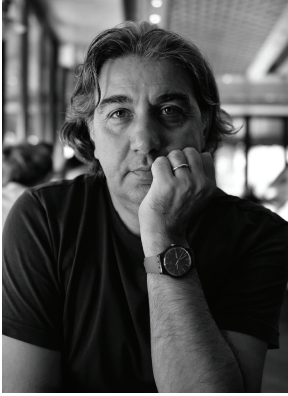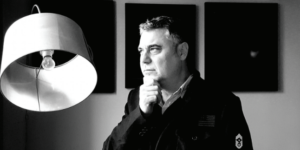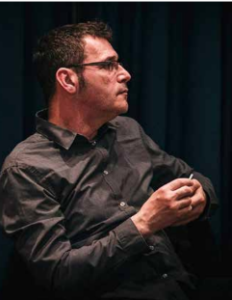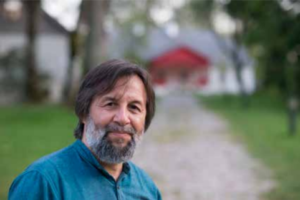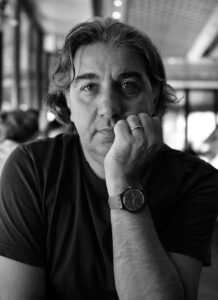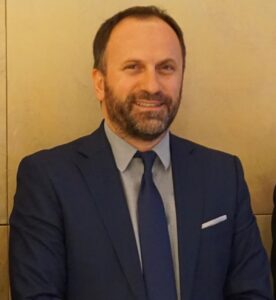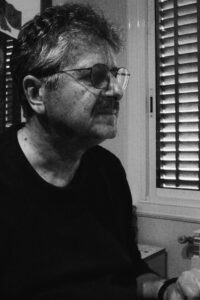Born in the port city of Durrës, Arian Leka belongs to the group of writers who emerged
as avant-garde after the opening of Albania’s borders. He is the author of many books of
poetry, prose, essays, and literary studies. Arian Leka’s works have been honored 6 times
with National Awards from the Ministry of Culture and 3 more International Literary
Awards, among them “Tudor Arghezi – Opera Omnia – 2022”. Earlier, his prose became
part of Best European Fiction-2011. Arian Leka’s books have been published in German,
French, Romanian, English, Greek Bulgarian, Serbian, Croatian, and Macedonian
languages. The critic emphasizes that his strong texts devoted to “the country and the
homeland” are nodes that connect the present with the history of the past in communism
and transform Albania’s maritime themes and symbols into the primary metaphorical
approach of his literary work, making unmistakable the voice of this author, who uses a
language special aesthetic. Through fact-fiction techniques, Arian Leka conveys fragile
details between his personal history and the history of Albania, especially in his books Born
in the Province, In Search of the Lost Shirt, and Mute Map for the Drowned. Arian
Leka has a PhD in Literary Studies and works as a researcher at the Academy of Sciences.
We are publishing a fragment from his last book, which he read at the festival “Tirana
Gate”.
My father was not a sorcerer, but he was able to see things that the rest of us could not see.
He spent his humble life as a seaman sailing the Mediterranean coasts. What especially
caught his eye on these voyages was not the people of the coasts or the mountainous
landscapes, which, to his surprise, had made the emptiness even more profound, nor was it
the endless waters or the skies that seemed for the most part to be slumbering in the dark.
Being a seaman in communist Albania meant that you were given the opportunity—one that
was quite limited—of seeing things that others would never see.
What mattered to us was not what the sailors exported to those shores; what was important
was what they brought home. But what did my father bring home from those journeys?
Silence. Mostly. When I asked him to tell me one of the most amazing things he had seen, he
said it had been the lights. “The lights of the harbors where we could never go ashore, and the
lights of the ships that we passed and hailed ceremoniously from a distance, exchanging
volleys of signal lights as if we were at war.”
Over time my father’s silence became more profound, but I continued to see the
Mediterranean lights through his eyes. I was not angry at his silence. Though we were not
living during the Spanish Inquisition, my father might well have been burned alive had he
spoken of the dim lights of those foreign cities. I had come to a realization: Light has the
nature of waves—I had learned that in school—so the distance between us and our maritime
neighbors could turn into light years. We were separated from the rest of the world not only
by the waves of the sea, but also by the waves of light.
My grandmother was a woman with a rare heart. She had the gift of seeing and foreseeing
what most of us could not even imagine. She was neither a witch nor a sorceress, but had
memorized the Holy Book, and from it she drew wisdom. In her day Albania was atheistic,
and to speak of God—though not the Devil—was blasphemy. So in order to protect herself,
she found shelter in a world of euphemism. She would use words related to light as an
oblique way of expressing her faith, without perhaps knowing that the monotheistic religions
had first come to light in the lands surrounding the Mediterranean.
My mother was not a saint, but she could sense the amazement in my mind. It was she who
first introduced me to the halls of the theater and the cinema. She opened a world of miracles
before me, igniting in my eyes a spark that was to turn into light.
And it was that light that I remember seeing when I entered the world of the theater. Where
did that light come from? Was it from the children’s theater in the town where I was born?
From that building which, in February 1967, was transformed from a Catholic church into a
marionette theater? The atheist revolution could have turned it into a warehouse or a shop,
but we ended up with a marionette theater and a cinema instead of a church. The frescoes on
the walls were plastered over but the large sanctuary lamps remained, dedicated to their
mission of spreading light.
Where did the light come from and how did it find its way to us? Did it not come to us over
the sea, something my late father would not even whisper? Did it descend from heaven, as
my grandmother had always believed? Or did the light come from the arts, as my mother
professed?
There were many questions for a child like me, who remembered the neighborhood near the
marionette theater and the two faces of reality in that era. Like every coastal region in the
Mediterranean, the town in which I was born had its own unhurried pace, lit and warmed as it
was by the light of the sun.
Few would have guessed that its monotony and languid siestas would be suddenly embraced
by the cinema. The backstreets of that fortunate neighborhood were the only ones in the city
that were to project their destitute lives onto the silver screen. This happened when the area
near the marionette theater in Durres was chosen to serve as the all-purpose movie set for
New Albania Cinema Studios, which was to shoot some of the first Albanian movie scenes in
those backstreets.
I knew that World War II had ended long ago, so I was quite confounded to see guerrilla units
still carrying out attacks and assassinations against the Nazi fascists. Walking through those
backstreets I would sometimes come across actors resting after filming a scene.
Peering over a wall I would see incredible things: A wounded partisan drinking water from
the very flask from which a German, armed to the teeth, had just drunk! Hadn’t they been
fighting only moments ago, trying to kill one another? The climax came when, after their
drink of water, the sworn enemies lit one another’s cigarettes as friends do. Were they no
longer enemies? Or did the movie resurrect them, just as God resurrects good people? And
this double reality of enemy and friend appeared openly, in front of everyone, in the light of
the sun!
For understandable reasons, scenes like this brought confusion to my still childish mind. But
the situation worsened when, after what I had seen in the backstreets, I returned again to the
darkness of the cinema. We were back to where we started, and the actors who had been
smoking cigarettes and drinking water together were once again enemies on the screen.
Which of the distorted realities should the child choose in moments such as these? I began to
suspect the man who was beaming dazzling light from the cinema projector. Was he perhaps
the one turning our friends into enemies?
I was even more confused when movies produced by the Communists were projected onto
the same screen where not long ago fascist documentaries had been projected. Ironically, the
name of the film studio that had produced the earlier films had to do with light.
It was Mussolini’s Istituto Luce, the Institute of Light! And the projector had shed light and
was continuing to shed light on both those who had lost the war and those who had won.
What was certain was that this movie machine had been made in one of the coastal cities
across the sea that my father might have seen but did not mention, as if they never existed.
How did this strange light get to that small and convoluted Mediterranean town? My father
believed that light came from the sea. My religious grandmother believed that the source of
light was spiritual and was born of something sacred that had lingered inside the church, even
though the church had been forced to become a marionette theater. My mother, who
cherished art, believed that light came only from the cinema and the theater and nowhere
else.
In the twilight of those halls I came to understand that applause is generally a sign of
appreciation, and that whistling is a sign of disapproval. This helped me discern the
differences between myself and people who did not believe the same things I did, and guided
me in my modest attempts at becoming a writer.
Thanks to those experiences, some illusions, especially those related to punishment and
justice, grew vigorously within me. The cinema and the church-theater of my childhood,
those dark rows where I sat surrounded by actors and marionettes, were to be the places
where I was to create my own chaotic utopia. Images of the socialist Albania where I grew
up, a state that represented itself as the place where evil was punished and good was always
rewarded, blurred my eyes for some time.
But how did that light get there? It should not have ended like it did. Everything came
tumbling down upon us when the communist system fell into its deathtrap. At once people
began to flee, trampling over one another, as if suddenly someone trapped in the darkness of
the cinema and trying to tear free of it, began to shout “Fire! Fire!”
Everybody rushed to abandon it before it collapsed and trapped everyone inside. The exodus
began. Instead of staying put to extinguish the fire, people were leaving the country in the
same way as those who flee a cinema engulfed in flames.
Gathered around the projector, like moths drawn to the light, people were brought back to
reality. The same question is of importance today: Where does light come from? Television
screens bathe us in the cliché of Mediterranean light. Those hypnotic murmurings: Close your
eyes! Come to the Mediterranean! You will find friendly people, sunlight, seafood, white
sand, the blue waters of the undulating Mediterranean and, above all, you will see the light,
buoyant and warm, of this fairytale sea.
But this is not a mirage, you’re not in a theater or a cinema. The people on screen are not
marionettes. What is happening is not stage drama. These are stories played by real actors in
the shimmering light of the Mediterranean. The lights emanating from your screens are not
the warm silent lights of the ships that my father had greeted with signals from a distance.
Do you see on your television screens the faint lights of boats carrying refugees? Do you see
them pushing helplessly through the darkness of the Mediterranean? These people have
honored us.
From all the seas of the world they have chosen to drown in the waters of the Mediterranean,
choosing the most difficult route, the most impossible destination. The refugees are drowning
in the depths of the Mare Nostrum only to have the fate of being counted among the missing
of our sea, and not being among those lost in an ordinary sea.
The Mediterranean, famed as a sea of light and friendship, has been transformed into a kind
of concentration camp for hopeless men, women, and children. Their lives are not counted.
They would never have believed that one day they would come to drown in this darkness of
misunderstanding. Thus the light falling on the surface of this sea is more like the moonlight
falling on a tombstone. Did we transform this beautiful sea of cooperation, culture, and
relationships into an azure tomb of mistrust? Did we do this by harnessing the nature of the
light wave?
Along with the people loaded into small boats, arriving from little-known cities in the
Mediterranean, civilization is also drowning in its own condescending and cynical sigh. And
here we are. We feel at a loss when it comes to wind direction and light source—“God
forfend!” as my grandmother often said—we are losing our minds, caught up in our
weakened consciousness. The questions remain: How did light come to us? Where does it
come from? And, most important: Why?
Translated from Albanian by Peter Constantine

